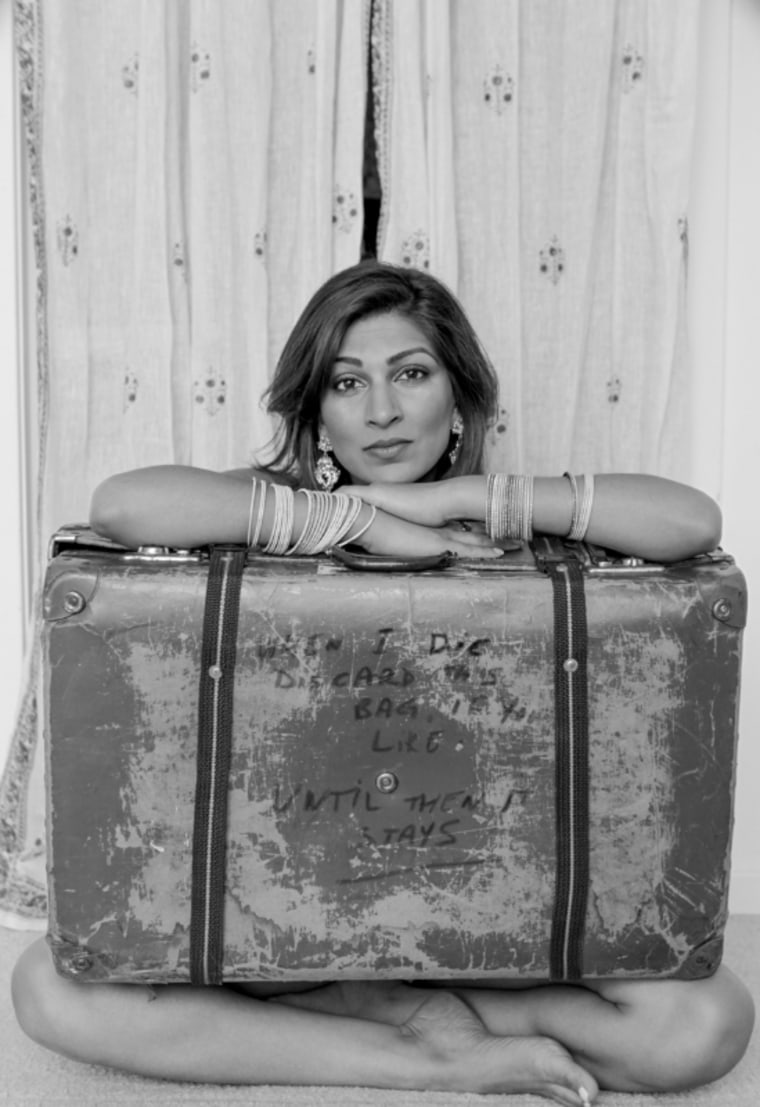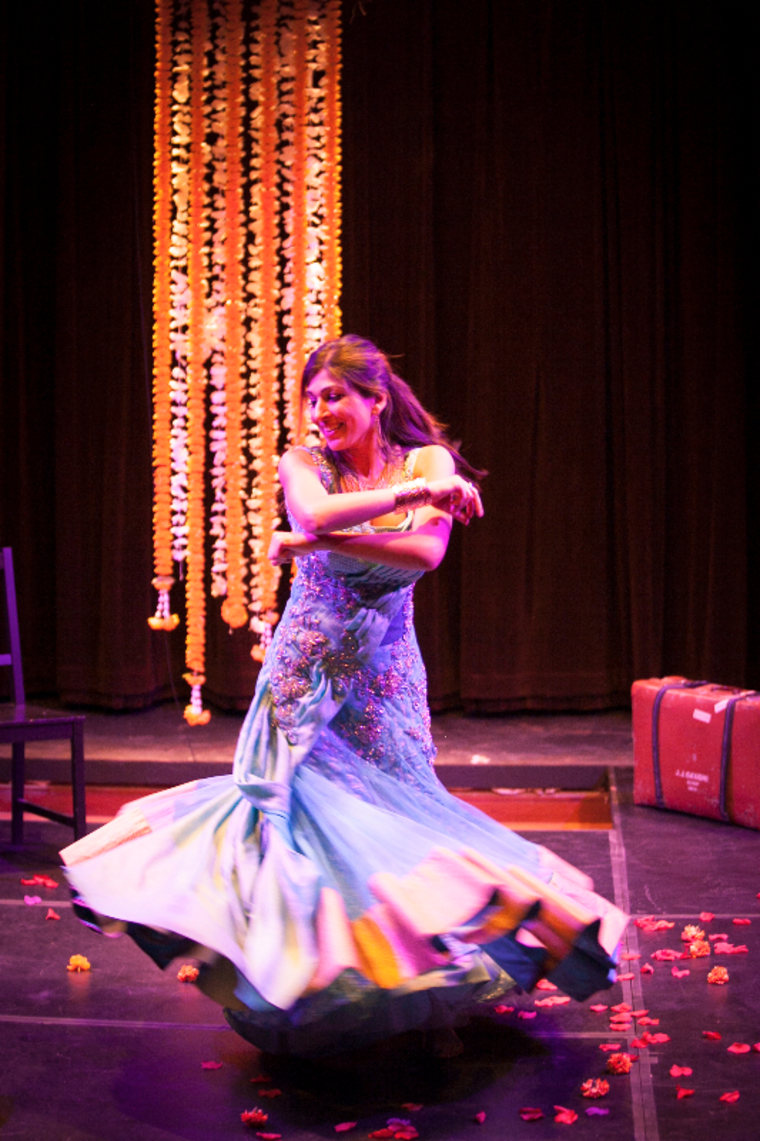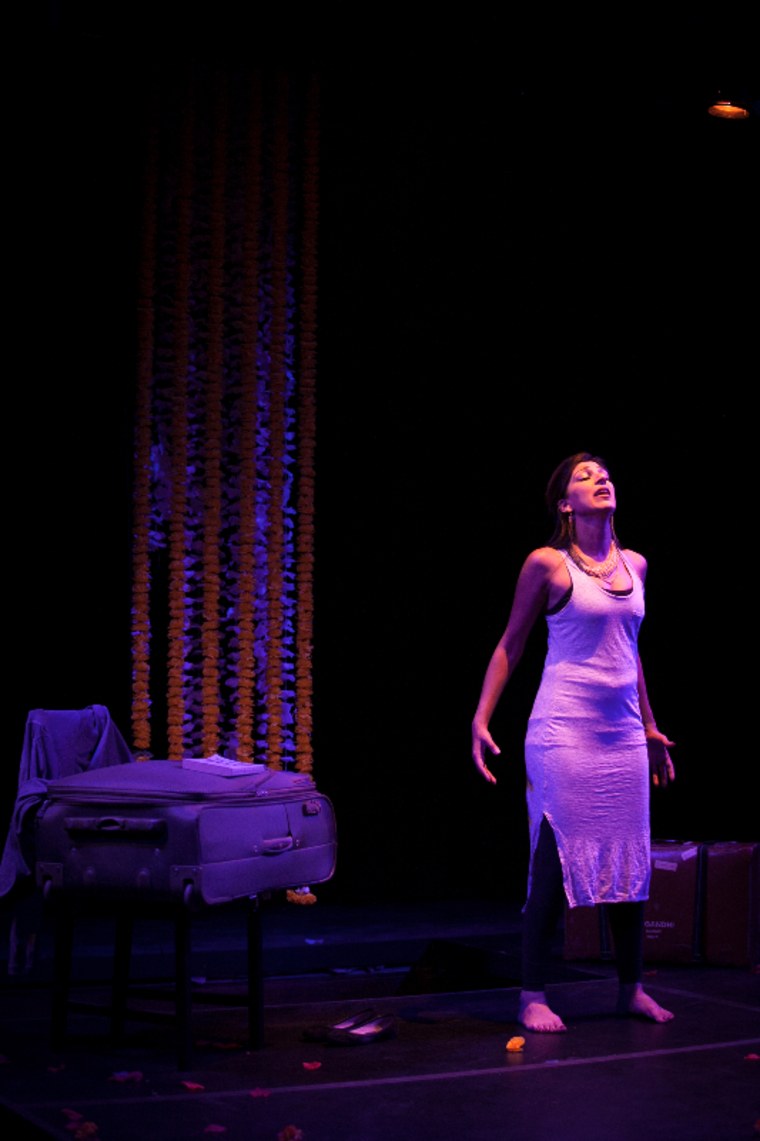When Minita Gandhi wrote her one-woman show “MUTHALAND,” she initially left out the story of her assault in India; but after the first table read of the play in 2015, the same year the Indian government banned the BBC documentary “India’s Daughter” — which told the story of a brutal gang rape in New Delhi that resulted in the death of a medical school student — she realized she couldn’t stay silent.
“We were having our first table read of the show and I had put together all these stories and I was skating over the assault. The assault wasn’t part of the play,” Gandhi told NBC News. “I thought I was healed, but I didn’t realize it….I’ve always been a strong advocate against victim shaming and I realized that I was silencing my own voice about the assault because there was a part of me that felt like I was ashamed."
In “MUTHALAND,” Gandhi plays the role of herself and the man who sexually assaulted her during her 2009 visit to India for her brother’s wedding. Writing and performing the play has been a difficult, but empowering, experience for the 38-year-old Chicago-based actress, who says she was ready to move forward and tell her story of resilience and faith.
“I was at a place in my life where I had a story in me that I felt compelled to tell. So I told it,” she said. “I had come to a point in myself as a woman and as an artist where I felt squished by the constraints of what society was telling me I could be and what I could and couldn’t talk about, and I had to break out of it.”
Gandhi says “MUTHALAND” is autobiographical and largely influenced by her family, and her upbringing and experience of being a first-generation Indian-American woman.
The play, which Gandhi describes as a “complex, dark comedy,” explores coming of age themes and failed romances to cultural and generational divides, as well as grappling with one’s identity.

Gandhi’s debut play is also in large part a “love note” to her parents, who have supported her through life’s journey. “By the end of the play I realized how aligned our values are and how everything they have tried so hard to teach me has really come out of love and peace," she said.
The play, which uses few technical elements, begins with two suitcases and ends with the symbol of her father’s old suitcase, which he carried with him during his first trip to the U.S. in the ‘70s.
Years ago, her father had used a Sharpie to etch the words, “When I die, discard this bag if you like, until then it stays” on his suitcase. That phrase prompted Gandhi to learn more about her family history and dig deeper. It was the first time Gandhi was able to sit down and candidly ask her parents about things she was not able to ask them before: arranged marriages, sex, dealing with in-laws, and what it was like to be in this country.
"I wanted to show the parallel of that with my life and how we carry our heritage, and carry our family history always whether we realize it or not,” she said.
'Painful, Beautiful, and Transformative'
In 2009, during her visit to India for her brother's wedding, Gandhi attended a meditation retreat in order to learn more about her religion and stay spiritually connected to her birthplace.
But at the time, her parents thought it would be unsafe for Gandhi to travel alone. Gandhi disregarded her parents’ request and decided to travel to a meditation retreat recommended by a family friend.

“It was bare bones, in the middle of nowhere, where you were on a strict diet, no alarm clocks,” she said. “And that’s something I wanted, very ayurvedic. I felt very safe there and open and I felt spiritually, like I was on the cusp of a breakthrough.”
A few days into the retreat, Gandhi says she was assaulted by a doctor who led regular morning yoga sessions. Shortly after the assault, Gandhi began to associate the country with a sense of darkness.
“I think what I hated is I hated the truth of the level of misogyny that does exist there, but the truth is it exists everywhere. At the time, I had assigned it to India, because the assault had happened there,” she said.
"I wanted to show the parallel of that with my life and how we carry our heritage, and carry our family history always whether we realize it or not."
Years later, Gandhi was ready to tell her story — one of hope, faith, and forgiveness — on stage.
“Writing ‘MUTHALAND’ was painful, beautiful, and transformative for me,” she said. “I will also never forget that moment. Because I questioned my own sanity in that moment. [...] That was the moment I learned strength. That was the moment that I was there for. I don't know where it came from but I stood up and spoke. And I spoke for myself, for my mother, for all the women I knew had never been able to speak because we had been gagged with the pervasive culture of silence. In that moment I demanded justice.”
Gandhi says the assault is just one part of the story.
“To me, the play is not about the assault. It’s about all of the things leading up to it,” she said. “The reason I have shaped it that way is because I really wanted to make a point that just because someone’s been through a traumatic event, that doesn’t define their whole being.”
Using Art as Activism
Once the decision to incorporate the details of her assault into the play were made, it became difficult, but necessary, to recreate certain scenes in order to continue the conversation about sexual assault. At the time, Gandhi told her dad she was in the process of putting together her first play. Gandhi experienced feelings of anxiety, wondering what sort of reaction or painful triggers it would inflict upon her South Asian family if she decided to put her story out there for the world to watch.

“My siblings could be hurt, my cousins could be hurt, there was also the feeling that somehow this place in India was going to know that I wrote about what happened and come after me in some way,” she said.
Gandhi remembers the moment when her father had asked if she was going to write about what had happened to her in India. “He got quiet and said, ‘Are you going to write about what happened? I don’t think that’s a good idea, don’t do it.’ And then my heart broke.”
She got off the phone, feeling discouraged at first, but then empowered. She then sent her father an article about women protesting the ban of “India’s Daughter,” which led him to change his mind.
“[My family] realized that writing about it and sharing about it might be good for sharing it to the world. They knew how much women’s rights and activism is important to me,” she said.

As an actress and female actor of color, Gandhi notes that there hasn’t always been a lot of great characters with great depth that she’s had the opportunity to play. But she believes that it’s changing, and says she hopes to be part of a movement to continue to enhance the visibility of more diverse voices in theater.
“What I learned through ‘MUTHALAND’ is that I can be part of the revolution of creating more diverse voices, more dimensional characters for women and people of color, and I’m really hungry to do that for myself and others,” she said.
“MUTHALAND,” which was initially workshopped and developed at Silk Road Rising Theater, has since appeared at various festivals and conferences, including the 5th National Asian American Theater Conference & Festival hosted by the Oregon Shakespeare Festival, and the Statera Foundation for Women in the Arts Conference. Its official world premiere — which will include full technical elements, along with a team of designers and press in attendance — will be held at 16th Street Theatre in Berwyn, Illinois, from Sept. 1 to Oct. 8, 2017.
“If I can use my art as activism, that’s why I got into theater,” Gandhi said. “For me, storytelling is my way to help make change in the world. Years later it’s finally come full circle through this play.”
Follow NBC Asian America on Facebook, Twitter, Instagram and Tumblr.
